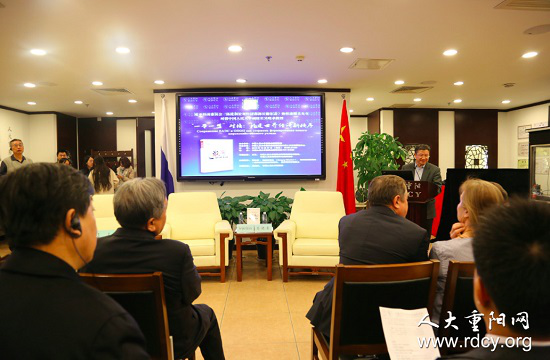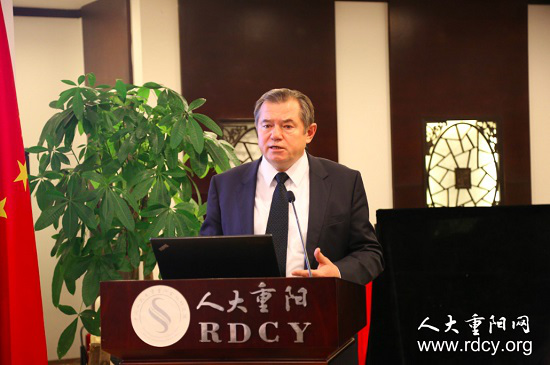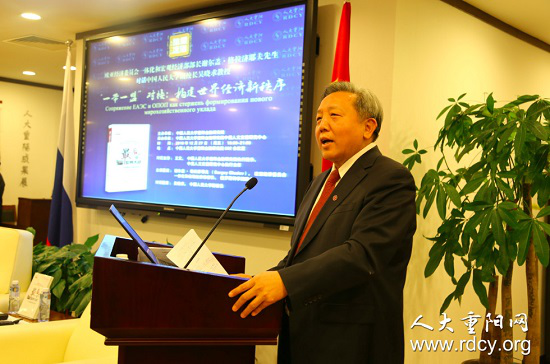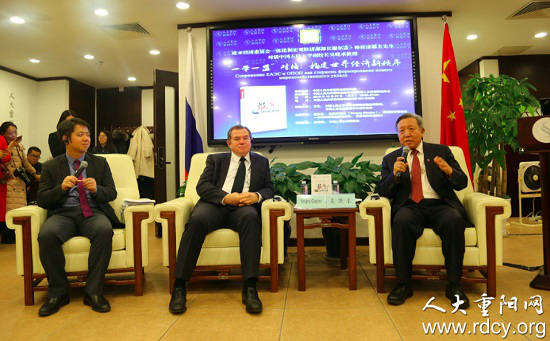Picture
Your Present Location: HOME> PictureDialogue between Sergey Glaziev and Wu Xiaoqiu: to build a new international economic order
Editor's Note: 2019 marks the 70 anniversary of diplomatic relations between Russia and China, and witnesses an increasingly mature China-Russia relationship. Leaders of China and Russia highly value the Belt and Road Initiative and Eurasia Economic Union, two major development plans in Eurasia, and vigorously promote the mutual complement between the two plans, “Connection between the BRI and the EEU”, setting a good example of mutual benefits and win-win cooperation in the regional economy.
On December 27th , the 46th Chongyang Forum, hosted by Chongyang Institute for Financial Study, Renmin University (RDCY) and organized by China-Russia People-to-People Exchanges Research Center of RDCY, invited Sergey Glaziev, a Russian politician and economist, advisor to the president of the Russian Federation on regional economic integration and member of the National Financial Council of the Bank of Russia. Glaziev has a dialogue with Wu Xiaoqiu, vice president of Renmin University of China (RUC) on the topic of "Connection between the BRI and the EEU: to build a new economic order in the world”. He also promotes his new book The Last World War: America started it and will loss it. The forum, presided by Wan Wen, Executive Dean of RDCY and Director of China-US People-to-People Exchanges Research Center of RDCY, gathers over 100 guests from embassies, universities, companies and media.

Zhang Shaohong, Editor in Chief of World Affair Press gives an opening remark
Zhang Shaohong, Editor in Chief of World Affair Press gives an opening remark first. He says, the most popular western theories in China are Liberalism, Constructivism , Clash of civilization, Thucydides Trap and so forth. Besides theories mentioned above, we also need to learn Russian opinions about the world economy and policy. Sergey Glaziev not only has a unique view about the world, but also forms a profound theory system, for instance, the “the long-periodic theory of economic and social development” providing a new view for seeking a better economic development pattern. So China should learn different theories from different countries, so as to hold an objective and accurate view about the world.

Sergey Glaziev makes a speech
At the keynote speech session, Mr. Sergey Glaziev expresses his sincere gratefulness to RDCY and World Affair Press for jointly producing his new book, and he is pleased that humanities exchanges between China and Russia have achieved more substantive results. In the book, Mr. Sergey Glaziev gives a detailed analysis of global economic technology, research results of the periodic law of social and political development as well as military force that will start a new world war against Russia. Having illustrated that conventional war is limited to protect the economic benefits of American power elites, he analyses causes and the leading force behind American aggression.
Then he gives speech on the subject of “Russia: with new technology and within the new world economic order”. He explains the theory“ Long-periodic theory of economic and social development” : the evolution of the world economic order is a long-period process. Every 40-50 years, there is a technological revolution, which will lead to financial expansion and the following war. According to his theory, we can predict future development based on present situation, outline the exchange principle of global technology and analyse structural changes in the global and national economy. Then we can help the fast-developing emerging countries to find a independent path to achieve comprehensive development.

Wu Xiaoqiu, vice president of Renmin University of China (RUC), makes a review.
Wu Xiaoqiu,vice president of Renmin University of China (RUC), then gives a review. Despite the fact that the shock therapy reform in Russia didn’t success, the market-oriented economic policies in Russia approved to be reasonable; the planned economy model in former Soviet Union period could never be continued. Since the reform and opening up, China has embarked on the development path of socialist market economy under the leadership of Deng Xiaoping. The reason why we abounded the Soviet Union’s economic theory and development pattern is that its systems and patterns are inappropriate to solve Chinese problems. Wu also mentions that 65% global payments are settled with USD, which justifies the United States hegemony. However, RMB could not be freely traded in global trade, so it is urgent to build China’s trade settlement system by accelerating the RMB internationalization progress. Although USD remains to be the dominant currency for a long time in the future, RMB is competent to be adapted in the international monetary system. He hopes that China , Russia and other counties, within the framework of Belt and Road Initiative and Eurasian Economy Union, build a global currency system that is not dominated by the USD completely.

Discussion Section
At last, Wan Wen, Executive Dean of RDCY and Director of China-US People-to-People Exchanges Research Center of RDCY, makes a conclusion that Chinese and Russian top economists and financial scientists exchanges their thoughts in this dialogue. The China-Russia relationship has always been one of the key points of RDCY research. RDCY has always been actively promoting the humanities communications among countries along the Belt and Road routes from the official and private channels, and has strengthened communications and exchanges with Russia. RDCY has kept close relationship with think tanks and research groups in Russia , not only holding a series of dialogues and visits, but also jointly producing many research results. With the help of Sergey Glaziev, RDCY has cooperated with his research team to hold 7 dialogues on Chinese and Russian economy and publish 5 important research reports in three years, making great contributions to China and Russia’s further development in the new era.























































































 京公网安备 11010802037854号
京公网安备 11010802037854号





